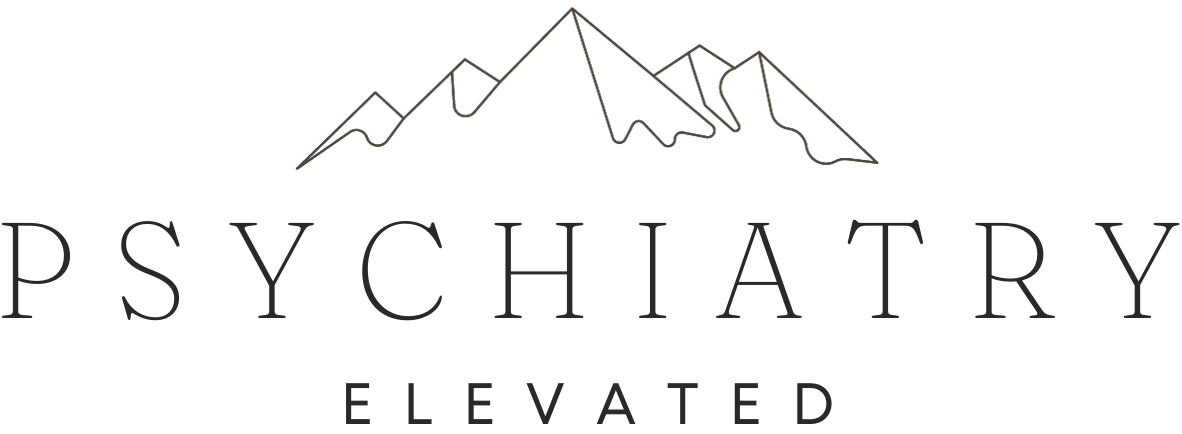Journal Prompts for Mental Health: Finding Clarity
You don’t need to love writing to benefit from journaling–you just have to be curious about what your mind is trying to tell you.
At Psychiatry Elevated, we encourage patients to use journaling as a bridge between their fleeting thoughts and fluctuating emotions–especially when life feels unmanageable. During stressful times, the simple act of writing can transform mental noise into patterns that you can actually work with.
If you’ve been feeling disconnected lately, unsure how to process things on your own, the following journal prompts for mental health can help you start listening inward.
Why Journaling Works (and What the Science Says)
The benefits of regular journaling prompts for mental health aren’t just anecdotal. Studies from the American Psychological Association show that expressive writing lowers stress hormones, stabilizes mood, and improves cognitive processing around emotional challenges.
When we write, we move emotions from our implicit memory (where they linger) into explicit memory (where our brain can organize them). This shift is what makes journaling such a powerful tool for long-lasting relief.
It’s important to remember that journaling isn’t about crafting perfect sentences. It’s about honesty. For many of our clients, combining journaling with Therapy for Fatigue & Burnout or Depression can be the catalyst for deeper breakthroughs.
How to Begin Your Journaling Practice
Before diving into specific journaling prompts for mental health, start small:
Create a routine: Mornings or evenings often work best, when your mind is quiet.
Write by hand: The physical act of pen on paper encourages more thoughtful reflection.
Let go of judgment: Grammar and structure don’t matter–focus on personal truth.
Keep it brief: Even five minutes a day can make a difference.
Some clients prefer to keep their journals private, while others share their journal entries with trusted friends or clinicians. What matters most is that the contents feel safe and secure.
Three Pathways: Journal Prompts to Explore Mind, Emotion, and Self
The following journal prompts for mental health are grouped into three pathways, each serving a different purpose. Explore them in any order that resonates with your current needs.
Pathway 1: The Mind
When anxiety takes over, writing can help reorient you to the present moment, emphasizing mindfulness and mental clarity:
Some prompts include:
What sensations do I notice in my body right now?
If my thoughts were weather, what would today’s forecast be?
What is one small thing I can control today, and one I can release?
Where does my mind go when it’s trying to protect me?
How can I make my environment feel 5% calmer this week?
Pairing these reflections with Medication Management can be particularly effective for those managing generalized anxiety or chronic stress.
Pathway 2: The Body
Our emotions carry their own wisdom, but we often speed past them. These prompts help translate emotions into language, building emotional literacy over time:
What emotion keeps showing up lately, and what might it need?
Where do I feel this emotion in my body?
What is one thing I’ve been avoiding feeling?
What helps me soothe myself when I’m overwhelmed?
Who makes me feel emotionally safe–and why?
The goal isn’t to fix these feelings but to explore them with curiosity. For many women navigating hormonal changes, this practice helps separate temporary mood shifts from deeper emotional undercurrents.
Pathway 3: The Evolving Self
This pathway moves beyond symptom management into growth, encouraging resilience over time:
What part of me feels ready for change?
When do I feel most like myself?
What have I outgrown, even if it’s still familiar?
What would it look like to live from calm instead of fear?
What kind of support would make the biggest difference right now?
At Psychiatry Elevated, we often integrate journaling into therapy itself, helping clients clarify what they want, from treatment and from life more broadly.
When Journaling Feels Difficult
It’s completely normal to feel resistance when journaling. You might feel blank, bored, or overwhelmed by too many thoughts.
Try one of these gentle adjustments to get started:
Start with lists: Write three things you’re grateful for or worried about.
Use timers: Write freely for five minutes, then stop.
Pair journaling with music or movement: Let rhythm open the door to emotion.
If journaling triggers overwhelming feelings, pause, make note, and bring those reflections to your therapist. Emotional processing is valuable, but it should happen when you feel safe in your environment.
The American Journal of Psychiatry notes that journaling can heighten emotional intensity in those with PTSD or major depression–so sharing your reflections with a trusted person can help the process feel more supportive. To learn more about journaling with PTSD, visit VeryWell Mind for further insights.
Combining Journaling with Therapy
We view journaling as a companion to therapy–not a replacement. Writing helps surface thoughts and patterns, while therapy provides the structure to reframe them. Your provider may even suggest personalized journal prompts that align with your treatment plan, making journaling a regular part of your healing journey.
A Simple Practice to End Your Day
Try this nightly ritual:
Write down one thing that felt hard today.
Write one thing that brought you peace.
End with one thing you’re grateful to carry forward to tomorrow.
Over time, this helps your mind recognize patterns–both good and bad.
Closing Reflection: Listening Inward
Every time you journal, you’re already making progress, showing up for yourself in a way that doesn’t always get applause but matters. You’re saying: My experience is important. My acknowledgment is enough.
Consider reaching out to our team at Psychiatry Elevated to explore how evidence-based therapy combined with journaling can help you build emotional resilience long-term. Clarity doesn’t always come from thinking harder, but rather, from listening actively.


